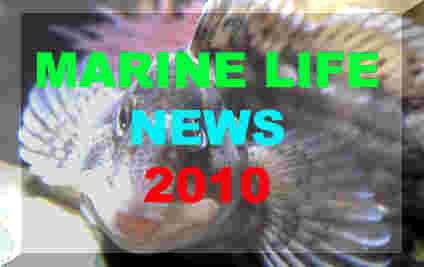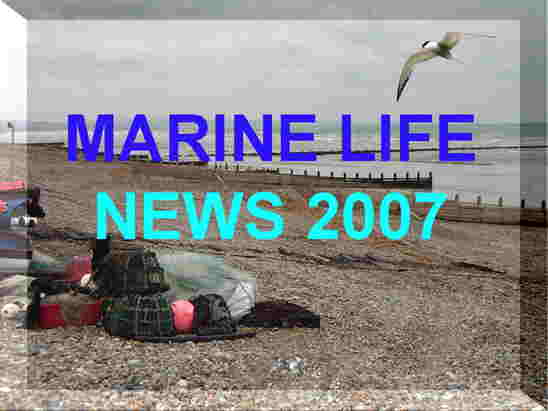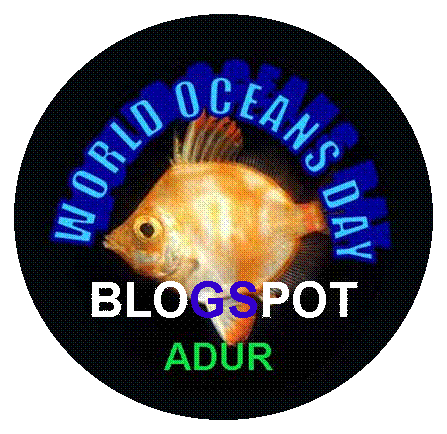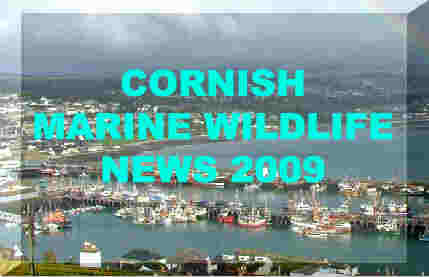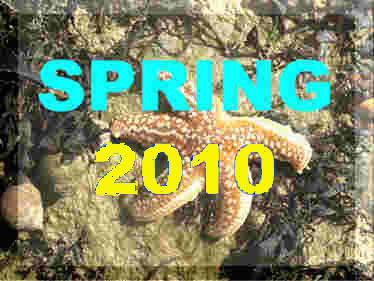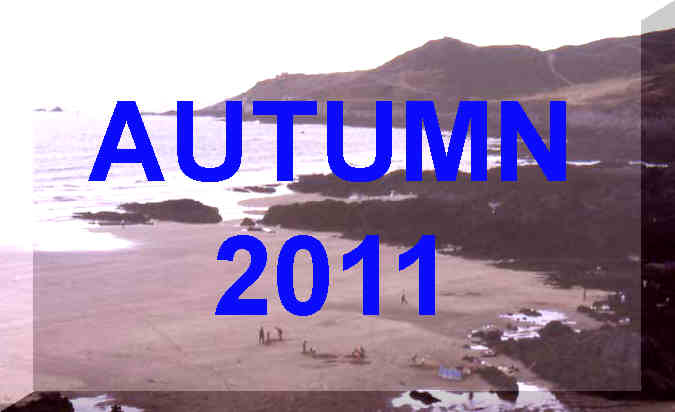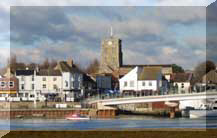EVENTS:
LATEST
NEWS:
27
June 2011
A
small
tidal wave was seen off Marazion
in Cornwall (by St, Michaels Mount) and estimated at 0.3
metre high at 10:15
am, appearing like a small bore in the Yealm
Estuary (SE of Plymouth
flowing out into Wembury
Bay), and detected on the south-western coast of the British Isles
recording tidal anomalies in Newlyn,
Cornwall at 0.2 metres
above predicted, in Plymouth at 0.3 m
and in Portsmouth
at 0.4 m. The
British
Geological Survey said there was no appreciable seismic
activity in the UK over the weekend.
17
June 2011
A
dead and decomposed Moray Eel, Muraena
helena,
was removed from the water by the Condor ferry ramp in St.
Peter
Port Harbour, Guernsey. This southern
sub-tropical species is an extremely rare discovery in British seas and
is normally found found around the Azores,
Canary
Islands and in the Mediterranean
Sea and further south. The last discovery
in Guernsey
seas was in 1996.
16
June 2011
A Humpback
Whale, Megaptera novaengliae,
was
spotted lunge feeding in Aberdeen
Harbour, during the evening. The following dawn it (or another whale)
was seen off Chanonry
Point, Moray Firth,
for two hours and later seen breaching near the Sutors
of Cromarty at 10:00 am.
The whale was off-route but it was seen moving further out of sea. The
large deep water Humpback Whales migrate
between their winter breeding grounds off Africa to summer feeding grounds
around Iceland and are more likely to be seen off the western coast of
the British Isles.
11
June 2011
Environmental
Festival & Adur World Oceans Day 2011
Understanding
and celebrating our marine environment
The
wind
and rain held off for the eleventh
Adur
Environment Festival and Adur
World Oceans Day went well in the marquee on
Coronation
Green, by Shoreham
Footbridge at the High Street
end on the second Saturday
of the Adur Festival. Len
Nevell of the British
Marine Life Study Society was there with the usual exhibition of lobsters
and crabs.
World
Oceans Day on Facebook
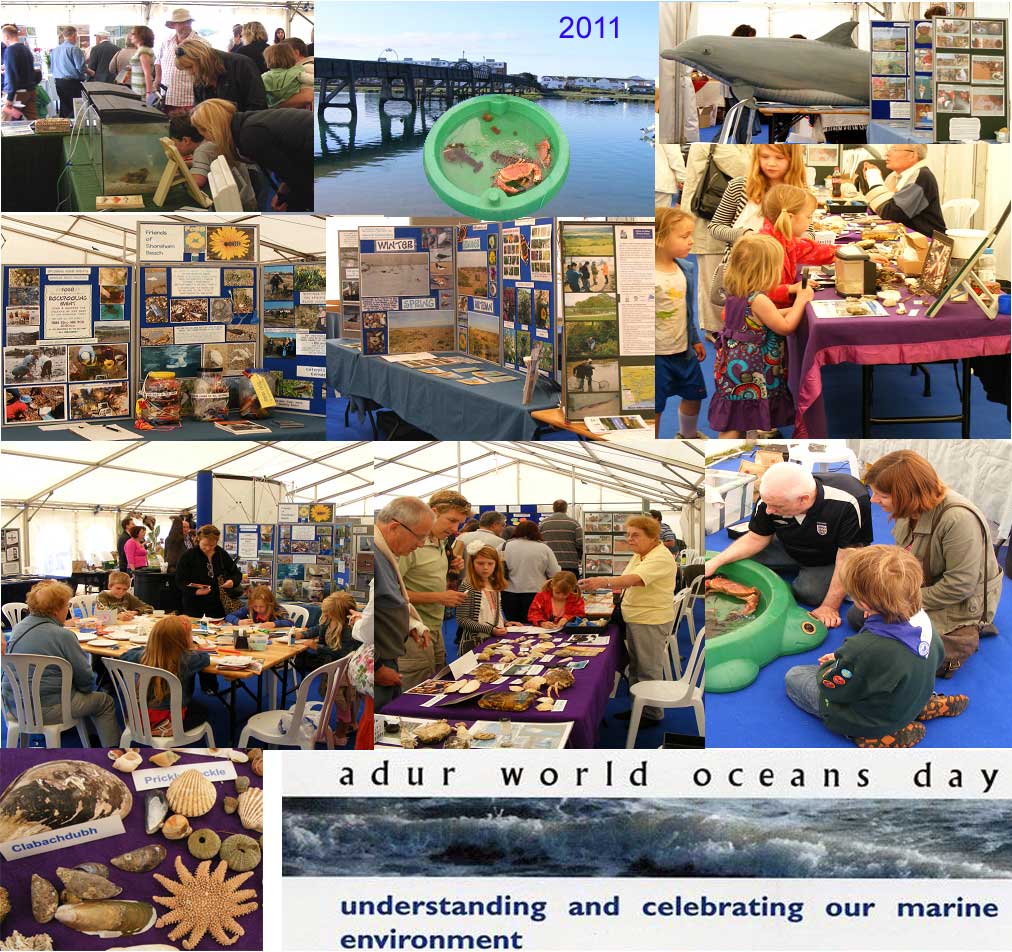
"The
aim of the event is to introduce the young visitors to the world of the
sea and seashore,
an opportunity they may not get.It is an educational event with an opportunity
for children to participate in the interactive
activities."
Quote
by Andy Horton (British Marine
Life Study Society)
Adur
World Oceans Day Blogspot 2011 et seq
8 June
2011
A Spotted
Bass, Dicentrarchus
punctatus, was caught on rod and line
by Lee Allen
off the west coast of Jersey, Channel Islands. This
southern warm water species is a rare visitor to the English Channel and
differs from the common Bass,
Dicentrarchus
labrax, by having dark black spots on its
silver flanks. Only a handful of Spotted Bass
have
been reported from British seas, but some fish may have been dismissed
as a variant of the Bass
rather than a different species.
1
June 2011
An
Otter,
Lutra
lutra, was spotted on a Dorset beach at
West
Bay, bear Bridport.
31
May 2011
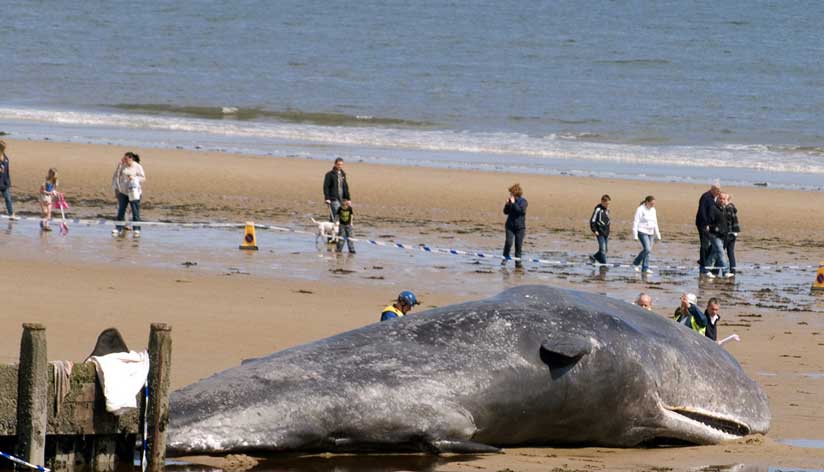
A
10.6 metre Sperm Whale, Physeter
macrocephalus, was discovered washed up alive
at dawn on the sandy beach at Redcar,
Cleveland,
near Middlesbrough, in the north-east of England. The stricken 20 tonne
mammal died a few hours later about 9.00 am.
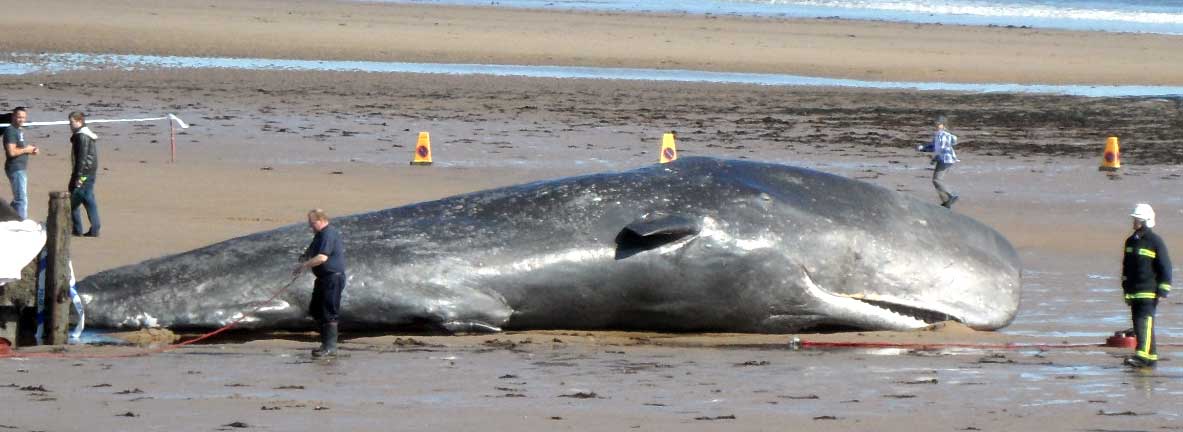
Sperm Whale
Photograph
by Cathy McBurney
on flickr
21
May 2011
A
large pod of 21 Fin Whales,
Balaenoptera
physalis, was spotted in an area known
as the Celtic
Deep, between north Cornwall and south west Pembrokeshire, about 60
miles offshore. Becky Scott
explained: “We saw five groups of Fin Whales
in little over half an hour, in group sizes of up to seven. The whales
were blowing frequently and some were lunge-feeding near the surface.”
"“We
have been monitoring Fin Whale
numbers in their Bay
of Biscay stronghold for over 15 years, so we are used to seeing large
numbers, but to see so many within British waters in close proximity is
unprecedented and an exciting new discover," said
Dr
Tom Brereton of Marinelife.
Dr
Jeroen van der Kooij from Cefas
commented: “acoustic echosounders detected
dense layers of krill
as well as sandeel
schools in the area, both of which are known to be key food sources for
these animals.”
Fin
Whale
Photograph
by Dr Tom Brereton
Due
to a lack of surveys in the past, it is unclear if Fin
Whales have always been present in the Celtic
Deep in the spring, but they are certainly rare during the summer months
when most surveys take place. However,
recent survey work by the Irish
Whale and Dolphin Group, the Sea
Trust and Sea
Watch Foundation indicate that Fin
Whales and other large whales are being increasingly
encountered in the Irish
Sea and Celtic
Sea.
BMLSS
Cetaceans
19
- 22 May 2011
A
large school of sixty plus Long-finned
Pilot Whales, Globicephala melas,
were
spotted swimming around in the confined shallow coastal
sea area of Loch Carnon,
South
Uist, in the
Outer
Hebrides,
Western
Isles, Scotland. Twenty of the small whales were recognised as being
injured from colliding with rocks in the narrow sea inlet that opens out
into the Sea
of the Hebrides on the eastern side of the island. Experienced cetacean
watchers said that the whales were very vocal on the first day when they
were near to the shore, but swam into deeper water in the loch on the spring
tide
and quietened down. As with the school that visited the loch on 2010,
there were serious concerns that the school of whales would become stranded
on the shore with healthy whales following the sick and injured to their
deaths. Finally the large school left the loch and swam south, but still
close to the rocky coastline. One dead Pilot
Whale was left behind and a post mortem is
being undertaken in gale force winds.
PS:
In 1837, 192
Pilot
Whales got trapped in Clachan
Sound, Scotland.
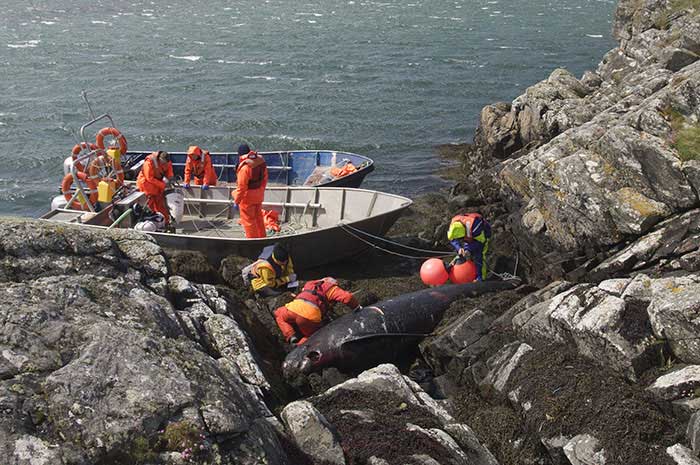
Retrieval of a dead Pilot
Whale
Jonathan
Mitchell Photography
British
Divers Marine Life Rescue and boatmen
from the Loch Carnan Salmon Farm and Smokery take samples for a post-mortem
and recover the corpse of the second dead Pilot
Whale off the rocks at Rhughasanish Point
at Loch Carnan on the Isle of South Uist in the Outer Hebrides.
Photographand
comments
by Jonathan
Mitchell
Map
of the Hebridean Seas
Map
of Carnan Pier Area
BMLSS
Cetaceans
Previous
Report from Loch Carnan 2010
 |
15
May 2011
An
unusual orange European Lobster,
Homarus
gammarus, was caught by a fisherman Steph
Noel near Icho Bank, South of St Helier, Jersey,
in his pots with the usual blue lobsters. Steph
had only caught three similarly coloured lobsters in 27 years of fishing
for them. The
lobster
was
returned to the sea.
BMLSS
Abnormal Lobsters
|
11
May 2011
A
White-beaked
Dolphin, Lagenorhyncus albirostris, was
washed up dead at Osmington
Mills near Weymouth, Dorset.
.
10
May 2011
Two
rarely recorded warm water alien species of barnacle
have been discovered on fishing pots tackle off the coast of Guernsey in
the Channel Islands. The Stalked Barnacle,
Scalpellum
scalpellum, was last recorded
in 1862 although a specimen was found in 2003.
The other species was an Acorn Barnacle, Solidobalanus
fallax, which was previously recorded
off Plymouth.
21
April 2011
A
Boar
Fish (or Zulu Fish),
Capros
aper, was behaving strangely, swimming
near the surface on an exposed rockpool at Challaborough
Beach,
south Devon, and we moved it from where we found it to a more secluded
pool.
This
pretty deep water fish is occasionally found in shallow water of the south-west
of England with occasional specimens a notable and interesting discovery
between the tides.
BMLSS
Boar Fish
17
April 2011
A
damaged 10.5 metre Sperm Whale, Physeter
macrocephalus, was discovered washed up on
the beach at Baleshare,
South
Uist, in the
Outer
Hebrides, Scotland.
BMLSS
Cetaceans

British
Marine Life News 2010
Cornish
Marine Life Records 2009 (Ray Dennis Records)
BMLSS
Oil Disasters page



